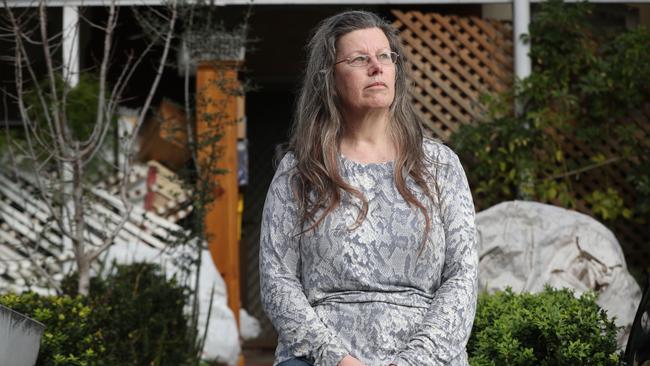When rentals go wrong: Eight tenancy disputes that ended up before SA’s Civil and Administrative Tribunal
“Filthy” homes, unapproved extra tenants and mooning the neighbours are among the renter behaviours that have ended up before SA’s Civil and Administrative Tribunal.
SA News
Don't miss out on the headlines from SA News. Followed categories will be added to My News.
There’s no doubt about it – renting can be tough.
For most, sky-high prices and a tight market will be the major issues to contend with when navigating the world of rentals.
But disputes between landlords and tenants, which pop up for a whole range of reasons, can be harder to resolve.
The Advertiser takes a look at eight cases where tenancies have gone wrong – and ended up before South Australia’s Civil and Administrative Tribunal (SACAT).
Patrina Kelly Henderson

Patrina Kelly Henderson, a hoarder, was evicted after she failed to comply with various orders to clean up her Housing Trust property at Pope Court, Adelaide.
An officer who inspected the property reported that it was “completely full” and, on a different occasion, there were rooms in which all of the items had been covered by sheets so they could not be seen.
SA Housing Authority ordered Ms Henderson – a failed Adelaide City mayoral candidate – to leave the property for reasons including the risk presented to herself and others should a fire break out.
Ms Henderson argued that the decision should be overturned for reasons including her hoarding disorder, that her possessions are valuable and “constitute a library”, that it would be discriminatory and that she would be forced to give up her companion birds.
The SACAT found her eviction “was the correct and preferable decision” and ordered her to leave the property in June 2023.
Stevan Mihajlowitsch
Stevan Mihajlowitsch was evicted from his Housing Trust property in 2021 after he cultivated cannabis plants and tampered with the electricity meter.
He told police he grows one cannabis plant a year for his own use but he did not drill the hole in his electricity meter
After a friend explained how he could use the hole to his benefit, he did not deny that he inserted a pin in the meter.
Mr Mihajlowitsch argued he should not be evicted because he was using cannabis to treat pain caused by a disability and he had spent a great deal of money renovating the property.
The tribunal evicted him but, following a review, he was granted extra time to remove a shed he had erected in the backyard.

Bronte Rachel Abbott
Bronte Rachel Abbott was ordered by the tribunal to pay $2173 to her landlords Susan and Melville Liddle – who also happen to be her parents.
A judgement said parts of the house had been left “filthy”, an extensive amount of rubbish had been left in the yard and in some rooms there had been “no attempt made whatsoever” to remove possessions and clean up.
Ms Abbott admitted she had smoked in the lounge room – which left nicotine stains on the walls – and had “not paid too much attention to the garden in two years”.
However, she argued she had been expected to return the property in an unreasonably “pristine” condition because the Liddles intended to put it on the market. She also claimed she had been treated unfairly because they are her parents.
The tribunal in 2022 dismissed those arguments and upheld the original compensation claim.
Norman Rose
Norman Rose had been accused of exposing his buttocks to his neighbour’s CCTV camera before he was evicted from his Housing Trust property at Woodville in late 2020.
The tribunal heard evidence that Mr Rose had caused other disturbances including shouting, being abusive, playing loud music early and late, interfering with neighbours’ bins and directing cameras at neighbours’ property.
A witness gave evidence that she was scared of Mr Rose and her activity had been “curtailed by his behaviour”.
But Mr Rose argued that all of the witnesses in the case had lied and the decision to terminate his tenancy should be therefore reviewed.
The tribunal found he had not demonstrated an arguable case and dismissed his application.
Barry Wallace
Barry Wallace rented a home at Nuriootpa from landlord Simon Pakula for about four years before he vacated in September 2022.
At the end of the tenancy, Mr Pakula demanded a total of $10,160 from Mr Wallace for work including cleaning, gardening, painting and carpet replacement.
Mr Wallace argued the property was in a poor condition when he moved in – but the tribunal ruled against him and found the condition was reasonable at the beginning of his tenancy.
He had painted sections of wall without permission from Mr Pakula, and there was “significant staining” to some sections of the carpet.
Mr Wallace explained had applied undercoat as he expected the walls would be repainted when he vacated, and he did not clean the carpet toward the end of his tenancy as he had been told it would be replaced anyway.
But the tribunal did not agree with Mr Pakula’s request for $2338 to replace the whole carpet or $6105 to repaint the entire house.
Ultimately, the tribunal ordered that Mr Wallace pay Mr Pakula a total amount of $1525 to cover part of the cost of the carpet replacement and painting, as well as contributions towards the cleaning, gardening and water supply.
Lauren Jade Green
Lauren Green rented a property from community housing provider Junction and Women’s Housing from September 2017 until she was served a notice at the end of 2020 that the tenancy would not be extended.
The tribunal heard that Ms Green had allowed undeclared occupants to live at the property, and there had been a history of “disruptive conduct” including loud music, fighting, abusive behaviour and problems with the dogs.
The housing provider had also received a notice that police were in possession of information indicating that controlled drugs were “regularly supplied from the premises”.
Ms Green appealed the decision not to continue the lease. She denied there had been unauthorised people living at the house, and criticism of the behaviour at her property was unfair because she had been “singled out”. She also told the tribunal she had difficult personal circumstances.
However, the tribunal upheld Junction’s decision to terminate Ms Green’s tenancy, finding that it was fair.
Peter Ivancic
Peter Ivancic was ordered out of his Housing Trust property after he sent a series of emails to the SA Housing Authority (SAHA) which were “aggressive, offensive, obscene and intimidatory”.
He also made a threat against a staff member who attended his home for an inspection.
Mr Ivancic was initially evicted but he argued the decision should be overturned because he was seeking assistance for long-term anger management, mental health support and behaviour change.
SAHA disagreed, and argued the evicted should be upheld.
On review, in December 2021, the tribunal ruled in Mr Ivancic’s favour and his tenancy was reinstated.
“In light of the starkly different behaviour and attitude of the tenant on review from that which gave rise to the application, and in particular in light of the steps he has taken to address his mental health, I consider it appropriate to give the tenancy a further chance to succeed,” a judgement said.
Sharon-Anne Cremin
Sharon-Anne Cremin moved into a property in March 2015 until she was told by her housing provider, Junction and Women’s Housing, that she would need to move out in early 2021.
The tribunal heard evidence that Ms Cremin had been warned multiple times that her tenancy was at-risk because of property damage, anti-social behaviour, rent arrears and unauthorised occupants.
Her housing manager said there had been multiple complaints from Ms Cremin’s neighbours that her behaviour had been intimidating, harassing and at times bullying. However, Ms Cremin rejected the allegation.
She argued she had been in extremely difficult personal circumstances over the last two to three years, which was an explanation for the issues that have occurred with the tenancy.
While SACAT acknowledged that Ms Cremin would be vulnerable if evicted, it found the decision to terminate her tenancy was fair and upheld Junction’s decision.




